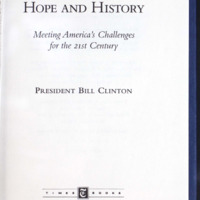-
Title
-
Between hope and history : meeting America's challenges for the 21st century
-
Description
-
Between Hope and History is President Clinton's credo, a concise statement of the fundamental principles that have guided his administration and its policies since its inception nearly four years ago. It continues, he writes, "the conversation I have had with the American people about our destiny as a nation." In the three main sections of the book - Opportunity, Responsibility, Community - the President explores the most important challenges we face today: making the American Dream available to every citizen willing to work for it; ensuring that individuals, families, businesses, and government shoulder their fair share of responsibility for themselves and one another; and seeking strength through diversity in a community of citizens united in a democracy whose achievements and glory are unrivaled.America, the President observes, stands at a pivotal moment in its history. At the edge of a new century, we must decide between two visions of America. One vision foresees an "every man for himself" society that seems calculated to divide our people rather than unite us, to weaken rather than strengthen the bonds of community, to pay lip service to the importance of families without assuring the tools by which families can succeed. It is, the President declares, "a vision that is bereft of the simple understanding that in America we must go forward together, and we don't have a single person to waste."
-
Identifier
-
584686
-
812929136
-
Creator
-
Clinton, Bill
-
Format
-
1st ed.
-
Source
-
Brian Lamb Booknotes Collection
-
Gift of Brian Lamb, 2011.
-
Catalog record
-
Language
-
eng
-
Date
-
1996
-
Program air date: December 15, 1996
-
Publisher
-
Times Books, Random House
-
George Mason University. Libraries. Special Collections & Archives
-
Text
-
Transcription of Annotations
Notes on front endpapers: Welfare mother 17 yrs old, p. 71. The press p. 62. My faith p. 135. Segregation p. 130. Arkansas, the boss. Seamus Heaney. Have you chosen a biographer. What is your vision for foreign policy p. 141, 144, 149. Military stronger than 4 years ago p. 148. What is this American dream p. 6. Roosevelt read a book a day. Do you have an unusual desire to please? Teachers tenture p. 44. Harlem Rail Yard p. 100. TV evening news p. 77., Welfare p. 66. FCC Spectrum p. 93. Kent and Carman Amos-87 kids. Mrs. Eliz. Buck Latin p. 129. Union City, N.J. p. 38. Tocqueville p. 115. Cynicism p. 12. progressive movement--LBJ, T.R. p 14, WW, FDR, TJ-p 127, ABE. Big government p. 88. TV-Music-Sex p. 120. Notes on back endpaper: Do you plan to support Al Gore for President in 2000. What do you think of government. What is your ideology--liberal/progressive etc. Why cynicism--where does it come from in our society. What are your plans after the Presidency. What words will survive 1st term. If you weren't a politician what would you be. Hope scholarship. AmeriCorps. V-Chips. Underlinings/Notes: Underlinings: Create opportunity, demand responsibility, forge stronger American community, Olympics, leadership abroad, build peace, American Dream, cut waste, balance budget, Family Medical Leave, Brady Bill, police, school anti-drug programs, AmeriCorps, information and cynicism, shared vision, Justice Oliver Wendell Holmes, unhampered initiative, Information Age, exports, car production, education reform, College Work Study program, pensions, child support, more responsive government, housing, home ownership. Notes: "Unifying vision," "balance budget," "100 million Internet," "information and cynicism," "Progressive Movement," "the future," "American Dream," "don't resent successful people," "global trade growth," "NAFTA, GATT," "Exports," "Union City, New J.," "D.C. situations," "Internet," "Goals 2000," "History standards," "Teacher tenure?" "Letter, man in mid-60s lost job," "Health ins.," "Starbucks," "tax cut bigger than we can afford," "Kent Amos," "87 kids," "urban family institutions," "Freedom of speech," "speak civilly," "the press," "welfare," "Food stamps," "Welfare mother at 17," "crime," "10 year old boy not safe," "TV evening news," "100,000 new police," "50,000 cell phones," "constitutional amendment," "Big Government," "role of feds," "military," "divided/we lose," "Tocqueville," "Putnam," "the Penny," "Hope, Hot Springs," "TV, music, sexual activity," "EITC," "smoking," "V-chip," "Jefferson," "Latin/Mrs. Elizabeth Buck. Fear each other," "Hope," "my faith," "pro-choice," "Foreign Policy," "slashed Foreign affairs budget," "Mexican loan," "military is stronger than 4 yrs. ago," "lead alliance," "the budget," "Big moment," "not promote government," "progressive," "Seamus Heaney," "William Nothdurft."
-
Relation
-
Original Booknotes interview
-
Rights
-
This work may be protected by copyright laws and is provided for educational and research purposes only. Any infringing use may be subject to disciplinary action and/or civil or criminal liability as provided by law. If you believe that you are the rights-holder and object to Mason’s use of this image, please contact speccoll@gmu.edu.
 584686.pdf
584686.pdf